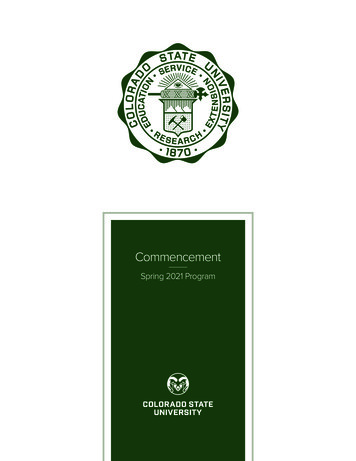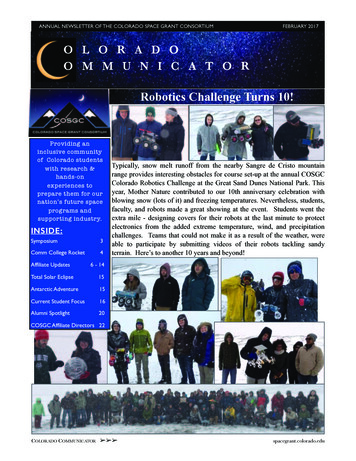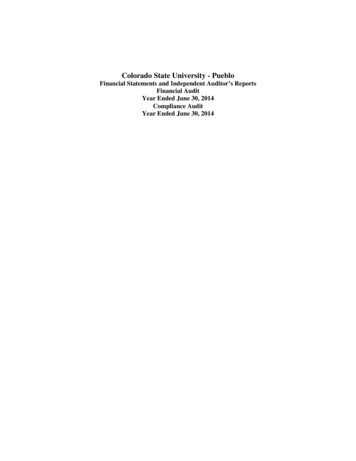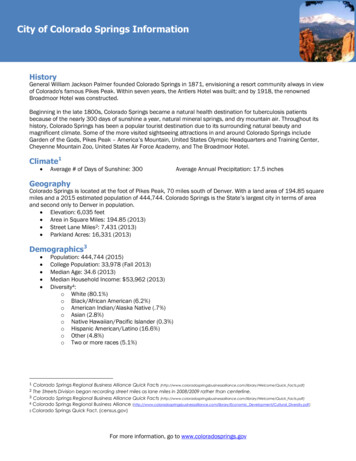
Transcription
Colorado State UniversityProcedures for Investigating and Responding to Complaints of Sexual Harassment underTitle IX Laws and RegulationsOriginal Effective Date: August 14, 2020ContentsINTRODUCTION .3SCOPE AND APPLICABILITY.3REPORTING.4PRIVACY OF INFORMATION.5SUPPORTIVE AND INTERIM MEASURES .5Supportive Measures.5Interim Measures.6Emergency Removal .7EXPECTATIONS AND RESPONSIBILITIES .7Parties’ Expectations .7Requirements of Administrators .8Training Materials .8PRELIMINARY INQUIRY .9Commencement of Inquiry .9Determination of Applicability of Title IX Procedures .9FILING A FORMAL COMPLAINT.9DISMISSAL OF THE FORMAL COMPLAINT . 10Required Dismissal . 10Discretionary Dismissal . 11Notice of Dismissal . 11NOTICE TO THE PARTIES. 11INFORMAL RESOLUTION PROCEDURES . 12FORMAL INVESTIGATION . 13Designation of Investigator . 13Nature of the Investigation. 14
The Parties’ Identification of Potential Witnesses and Documentation . 14Investigation Procedures. 14Failure to Participate. 15Deadlines/Extensions of Time. 15Investigation Report. 15Referral to Student Conduct Services . 16ADVISORS AND SUPPORT PERSONS . 16Advisors . 16Support Persons . 17HEARINGS. 17General Provisions . 17Hearing Procedures . 18Final Determination. 19APPEALS OF FINAL DETERMINATIONS. 20Grounds for Appeal . 20Appeal Procedures . 20RETALIATION; MATERIALLY FALSE STATEMENTS;RELATED VIOLATIONS . 21RECORDKEEPING. 22Procedures for Investigating and Responding to Complaints of Sexual Harassment2
INTRODUCTIONColorado State University (“CSU” or “the University”) is committed to maintaining aneducational and employment environment free from sexual harassment. To this end, CSU hasadopted a policy entitled “Title IX Sexual Harassment” (the “Policy”) that prohibits theseforms of misconduct and provides that individuals found responsible for violating the policywill be subject to sanctions. The grievance procedures described in this document will guidehow CSU will investigate and respond to complaints of sexual harassment under the Policy.The Procedures are meant to be utilized with the Policy. The Policy defines terms that areutilized throughout these Procedures.These procedures provide for a prompt and equitable resolution of matters reported that aresubject to Title IX regulations and the Policy. CSU will treat all those involved in a sexualharassment grievance proceeding pursuant to the Policy fairly and equitably in accordancewith the Title IX regulations. Differences between one party’s rights and options and anotherparty’s rights and options will never be based on sex.Under the Title IX law and regulations, the parties to a proceeding are referred to as the“Complainant” and the “Respondent”. Under CSU’s policies, these parties are usually referredto as the “Impacted Party” and the “Responding Party,” respectively. The legal terms and CSU’sterms are used interchangeably in these Procedures.SCOPE AND APPLICABILITYThese Procedures apply to conduct that occurs on university property, and to conduct thatoccurs off university property, including electronic conduct, when the conduct occurs in thecontext of a university employment or education program or activity in the United States,including, but not limited to, university-sponsored academic, athletic, extracurricular,research, online or internship programs or activities.These procedures address incidents that are covered under the Title IX law and regulationsbecause they meet the definition of “sexual harassment” in that law (see the Policy, Section 2,Definitions). These procedures do not address sexual misconduct that is prohibited underCSU’s Policy but does not equate to sexual harassment as defined by Title IX. Such sexualmisconduct is governed instead by the Student Conduct Code where the Responding Party is astudent or the Office of Equal Opportunity’s (OEO’s) grievance procedures where theResponding Party is a non-student. Student employees accused of sexual misconduct may besubject to either or both student and employee procedures and sanctions, depending upon thefacts and circumstances.Notwithstanding the above, the University reserves the right to determine which proceduresto apply to a formal complaint and to specify one procedure for multiple allegations in acomplaint, even where some allegations may fall with the Title IX regulations and some maynot.Procedures for Investigating and Responding to Complaints of Sexual Harassment3
REPORTINGAny person experiencing an immediate safety concern, or who observes a crime inprogress or having just occurred, should immediately call 911.How to ReportAnyone may report an incident of sexual harassment, sexual misconduct or gender-baseddiscrimination to the Office of Title IX Programs and Gender Equity as follows:In person during business hours:Office of Title IX Programs and GenderEquity123 Student Services Building (corner ofUniversity Ave. and Libby Coy Way)Fort Collins, CO 80523By telephone: 970-491-1715By postal mail:Office of Title IX Programs and GenderEquity0160 Campus DeliveryFort Collins, CO 80523-0160By email: [needed] Titleix@ColoState.eduOnline: click ng-options/)Responsible Employees, as defined in the Policy, who witness or receive informationregarding an allegation of sexual harassment, sexual misconduct, or relationship violencemust report all known details within 24 hours to the Title IX Coordinator, Deputy Title IXCoordinator, or designee in the Office of Title IX Programs and Gender Equity. All othermembers of the CSU community are strongly encouraged to report to the Title IX Coordinator,Deputy Title IX Coordinator, or Office of Title IX Programs and Gender Equity any informationlearned about an alleged incident of sexual harassment, sexual misconduct, gender-baseddiscrimination or relationship violence known to the individual as soon as possible. Thenames and contact information for the Title IX Coordinator and Deputy Title IX Coordinatorsare on the CSU Title IX web page.Notwithstanding these obligations, anyone may report an incident at any time; there is notime limit on reporting to the University.An Impacted Party may choose to report their complaint to law enforcement. A lawenforcement investigation may take place simultaneously with these procedures. In caseswhere there is an immediate threat to safety, a violation of an existing measure, or a minorinvolved, CSU is required to report to the police. In cases where a report is made to lawenforcement by CSU, the Impacted Party has the choice to participate in the criminalinvestigation, or not.Procedures for Investigating and Responding to Complaints of Sexual Harassment4
The Title IX Coordinator or designee may direct an investigation into complaints of conductthat is prohibited by the Policy, whether or not it also constitutes a crime under applicablelaw. An Impacted Party has the option to report to law enforcement but is not required to doso. Even if a matter is not reported to law enforcement, this does not negate the University’sobligation to investigate the matter.A concurrent law enforcement investigation could delay the timing of any Universityinvestigation under these Procedures. If this occurs, the Impacted Party and Responding Partywill be notified of the delay.PRIVACY OF INFORMATIONCSU has an obligation to maintain an environment free of sexual harassment and misconduct.Students and employees who want to discuss a complaint in strict confidence may use theconfidential support resources listed in the Policy and on the CSU Title IX website.Under the law, Responsible Employees (see definition in the Policy) have mandatoryreporting and response obligations and cannot honor an Impacted Party’s request not tomake a report to the appropriate administrators. Responsible Employees must, however,maintain privacy of any information disclosed other than by making a required report. TheTitle IX Office and the Office of Equal Opportunity will share information only as necessary,and only with people who need to know to fulfill the purposes of the Policy, the Procedures,and applicable law. This may include investigators, witnesses, administrators, and the partiesand their advisors. CSU will comply with the Family Educational Rights and Privacy Act(“FERPA”) and other confidentiality laws as they apply to Title IX proceedings.SUPPORTIVE AND INTERIM MEASURESAfter receiving a report of sexual harassment, the Title IX Coordinator or designee willevaluate available information to determine the need for any supportive or interim measuresand provide appropriate resources to both parties both on and off campus. Supportive andinterim measures will be reviewed for appropriateness and possible adjustment as additionalinformation is received. The parties involved in allegations of prohibited conduct are entitledto receive information and assistance regarding supportive and interim measures whether ornot the Impacted Party chooses to file a formal complaint with the University and/or report acrime to local law enforcement. Information about supportive and interim measures placedon the parties will be kept confidential by the University to the greatest extent practicableunder the circumstances.Supportive MeasuresAfter receiving a report of sexual harassment, the Office of Title IX Programs and GenderEquity will promptly contact the Impacted Party to discuss the availability of supportivemeasures. Supportive measures are non-disciplinary, non-punitive, individualized servicesProcedures for Investigating and Responding to Complaints of Sexual Harassment5
designed to restore or preserve equal access to the University’s education program or activity.Supportive measures are offered as appropriate, as reasonably available to the ImpactedParty or the Responding Party before or after the filing of a formal complaint or where noformal complaint has been filed. Supportive measures may include, but are not limited to:counseling, extensions of deadlines or other course-related adjustments, modifications ofwork or class schedules, campus escort services, mutual restrictions on contact between theparties, changes in work or housing locations, leaves of absence, increased security andmonitoring of certain areas of the campus, and other similar measures. Each party is alsoprovided with a list of appropriate resources by the Title IX Office at the time of the party’sinitial contact with that office.Interim MeasuresInterim measures may be instituted by Student Conduct Services in the Student ResolutionCenter after a report is received from the Office of Title IX Programs and Gender Equity.Depending on the nature of the complaint, CSU may take any and all interim measures itdeems necessary to protect the CSU community or any of its individual members. Interimmeasures may be imposed effective immediately, without prior notice, when in the judgementof the Director of the Student Resolution Center, the seriousness of alleged behavior threatensthe safety and well-being of members of the University community, threatens universityproperty or has potential to disrupt or interfere with normal University operations.Parties are encouraged to contact the Title IX Office to make a request for interim measures.The purpose of such measures is to address safety concerns and minimize, to the extentreasonable and practical, the impact on the involved parties.Examples of interim measures include:No-contact order with proximityInterim trespass orderInterim residential relocationInterim residential suspensionInterim university suspensionInterim transcript notationInterim registration holdInterim degree holdRequest for academic adjustmentsChange to dining and/or transportation arrangementsAdjustment to on-campus working arrangementsLimitation or prohibition regarding participating in University activities absent writtenauthorization from an appropriate University officialProcedures for Investigating and Responding to Complaints of Sexual Harassment6
Emergency RemovalInterim university suspension, interim residential suspension, and interim trespass ordersmay result in the removal of a Responding Party from a University education program oractivity on an emergency basis. Such actions may be taken only after an individualized safetyand risk analysis has resulted in a determination by the Director of the Student ResolutionCenter or designee, for students, or by the Title IX Coordinator or designee, for employees(including student employees), that there is an immediate threat to the physical health orsafety of any individual arising from the allegations of sexual harassment. In the event of suchaction, the Responding Party will be provided with notice and an opportunity to appeal thedecision immediately following the removal. The review will be conducted by the StudentConsult Team Title IX Subgroup or the Employee Consult Team.For non-student employees under emergency removal, during the pendency of a proceedingunder the Policy, a non-student employee Responding Party may be placed on AdministrativeLeave.Law enforcement may address any imminent safety concerns independent of the emergencyremoval review procedures.EXPECTATIONS AND RESPONSIBILITIESAn Impacted Party may choose not to file a formal complaint or participate in theinvestigation; however, all other University students and employees are expected tocooperate with an investigation. Failure to participate may limit but not eliminate theinvestigation.Parties’ ExpectationsThroughout the grievance proceedings, the Impacted Party and the Responding Party canexpect:1. Information and an explanation regarding the Policy and the Procedures2. The option to report the allegation(s) to local law enforcement3. Supportive and interim measures that are reasonable and practicable under thecircumstances4. Information about, and assistance obtaining, available resources for medicaltreatment or counseling5. Written notice of allegations leading to an investigation, including informationabout the conduct alleged and potential Policy violation6. Reasonable time to respond to allegations as well as prompt and equitableresolution of formal complaints under these Procedures7. An opportunity to offer information or evidence and identify witnesses relevant tothe investigationProcedures for Investigating and Responding to Complaints of Sexual Harassment7
8. The opportunity to have an advisor of their choice, subject to the limitationsoutlined in Section 13, to attend meetings or proceedings where the party ispresent9. Access to any information used by the decision makers in making a final decision10. The opportunity to submit concerns or issues about the process includinginvestigator bias or conflict of interest to the Title IX Coordinator or the VicePresident for Equity, Equal Opportunity and Title IX11. Written notice of investigatory outcomes12. The opportunity to appeal a final finding of responsibility and any sanctionimposed13. Both freedom from and the responsibility to refrain from retaliation14. The responsibility to provide truthful and complete information to the best of one’sabilityRequirements of AdministratorsAny individual designated by CSU as a Title IX Coordinator, Deputy Title IX Coordinator, TitleIX investigator, Title IX decision-maker, or facilitator of an informal resolution of a Title IXmatter, shall:1. Not have a conflict of interest in the matter.2. Not have a bias for or against impacted parties or responding parties generally, noras to the individual parties in the matter.3. Be trained on sexual harassment.4. Be trained on the scope of the educational program or activity in which the allegedconduct took place.5. Be trained on how to conduct an investigation, hearing, appeal, or informalresolution procedure, as appropriate, and how to serve impartially.6. Be trained on any technology to be used in the hearing process, if participating inthe hearing.7. Be trained on issues of relevance and evidence, if serving as a hearing officer.8. Be trained on issues of relevance in creating investigative reports, if serving as aninvestigator.Training MaterialsAny materials used to train the individuals referred to above must not rely on sex stereotypesand must promote impartial investigations and adjudications on formal complaints. All suchmaterials will be posted online to be publicly available.Procedures for Investigating and Responding to Complaints of Sexual Harassment8
PRELIMINARY INQUIRYCommencement of InquiryAfter receiving a report of alleged conduct prohibited under the Policy, the Title IX Office willconduct a preliminary inquiry. This is an initial gathering of information that will enable theUniversity to assess the need to take any immediate action to address the safety and healthneeds of the Impacted Party, Responding Party and the CSU community. In addition, thisprovides an opportunity to assess next steps for investigating reported conduct. At this stage,the Title IX Coordinator or designee will determine if the allegations, if true, would rise to thelevel of a violation of the Policy and warrant a full investigation. If the Title IX Coordinator ordesignee finds that the information available does not warrant proceeding to a formalinvestigation, the matter will be closed, but may be reopened if further information isreceived.This preliminary inquiry may include, but is not limited to, information gathering from theparties, soliciting written statements, meeting with witnesses, and gathering otherinformation necessary to make decisions as to the appropriate resolution. If the matter isclosed, CSU reserves the right to reopen a preliminary investigation at any time.If an Impacted Party requests that the process not move forward or refuses to participate, theUniversity will weigh that request against the University’s obligation to address any risk ofharm to the Impacted Party or other individuals in the community and the nature of theincident or conduct at issue and may proceed as determined appropriate. The Title IXCoordinator has the discretion to file a formal complaint of a policy violation even if theImpacted Party chooses not to do so.At any time, the Title IX Coordinator and other University officials may conduct a threatassessment to determine the risk of harm to the parties or to the University community. TheTitle IX Coordinator or designee will use the information gathered to determine how to moveforward.Determination of Applicability of Title IX ProceduresAnother purpose of the preliminary inquiry is to enable the Title IX Coordinator or designeeto determine whether the allegations in the report, if true, would constitute sexualharassment subject to the Title IX law and regulations. If so, the matter will proceed accordingto these Procedures. If not, other University procedures and processes may apply, includingthe Student Conduct Code where the Responding Party is a student, and the Office of EqualOpportunity’s grievance procedures where the Responding Party is an employee.FILING A FORMAL COMPLAINTAn Impacted Party may file a formal complaint alleging any action that would be prohibited bythe Policy. Once a formal complaint has been filed, the procedures for investigation, hearingsProcedures for Investigating and Responding to Complaints of Sexual Harassment9
and appeals set forth in these Procedures will apply until the complaint is resolved either bydismissal of the complaint, or a final determination is issued regarding responsibility of theResponding Party, and any appeals are decided (or the time for an appeal has passed withouta filing). The formal complaint must be filed in writing with the Office of Title IX Programsand Gender Equity, 123 Student Services Building, Fort Collins, CO 80523-0160, 970-4911715. Complaints may be filed online, via email, by postal mail, or in person. The complaintmust be signed by the Impacted Party (Complainant). Digital signatures are acceptable. Theinformation contained in the formal complaint should be as specific as possible, including thefollowing (if known): Name, address, telephone number, and email address of each Impacted Party(complainant) filing the formal complaintDate, time and location where the alleged sexual harassment or sexual misconductoccurred (for each instance, if occurring on more than one occasion)Name(s) of the alleged perpetrator(s) of the sexual harassment or sexual misconductName(s) of all witnesses to the occurrence(s)Request that the allegation of sexual harassment be investigatedDescription of the behavior of the alleged perpetrator(s) on each such occasionAny other information that the Impacted Party wishes to provide regarding theoccurrence(s) and impactsNote: legally privileged information such as medical records, attorney-client privilegedinformation, or discussions with a victim advocate, rape crisis counselor, orprofessional counselor need not be providedPromptly after a formal complaint is received by the Office of Title IX Programs and GenderEquity, a representative of that office will contact the Impacted Party to discuss next steps inthe grievance procedure.Where two separate complaints contain allegations arising out of the same facts orcircumstances, the Title IX Coordinator may consolidate the complaints into one proceeding.Where a formal complaint involves more than one Impacted Party and/or more than oneResponding Party, references in these procedures to a singular party include the plural, asapplicable.DISMISSAL OF THE FORMAL COMPLAINTUnder the circumstances described below, the University must, or in some cases may in itsdiscretion, dismiss a complaint. Dismissal of the formal complaint does not preclude theUniversity from conducting a review and taking action under the Student Conduct Code or anyrules or policies governing the conduct of a student or an employee.Required DismissalThe formal complaint must be dismissed if it is determined at any time that:Procedures for Investigating and Responding to Complaints of Sexual Harassment10
The conduct alleged in the formal complaint would not constitute sexualharassment as defined above, even if proven by a preponderance of the evidence;orThe conduct alleged in the formal complaint did not occur in the University’seducation program or activity or did not occur in the United States. As used herein,“education program or activity” includes all incidents occurring on universityproperty and property owned or controlled by a student organization recognizedby the University. Discretionary DismissalThe formal complaint or any allegations therein may be dismissed by the Title IXCoordinator if, at any time during the investigation or hearing, any of the following occurs: The Impacted Party notifies the Title IX Coordinator in writing that they wouldlike to withdraw the formal complaint or any allegations therein;The Responding Party is no longer enrolled or employed by the University; orSpecific circumstances prevent the University from gathering evidence sufficientto reach a determination as to the formal complaint or allegations therein.Notice of DismissalUpon a dismissal required or permitted above, the Title IX Coordinator or designee willpromptly send written notice of the dismissal and reasons simultaneously to the parties. Thenotice shall advise the parties regarding their rights to appeal.NOTICE TO THE PARTIESAfter a formal complaint is filed, the Office of Title IX Programs and Gender Equity willprovide written notice to the parties of the following:1. The University’s grievance procedures for Title IX matters, including informalresolution procedures2. The allegations of conduct potentially constituting sexual harassment as defined in theTitle IX regulations and CSU’s policy, including the portions of the Policy that arealleged to have been violatedProcedures for Investigating and Responding to Complaints of Sexual Harassment11
3. The identities of the parties involved in the alleged incident(s), if known4. The date(s) and location(s) of the alleged incident(s), if known5. That the Responding Party is presumed not responsible for the alleged conduct andthat a determination regarding responsibility will be made at the conclusion of thegrievance procedures6. That the parties may each have an advisor of their choice, who may be, but is notrequired to be, an attorney7. That knowingly making a false statement or submitting false information in thegrievance process is a violation of the CSU Policy on Title IX Sexual Harassment and theStudent Conduct CodeThis written notice does not constitute a finding or a determination of responsibility.INFORMAL RESOLUTION PROCEDURESThe informal resolution process is voluntary. It is designed to resolve complaints without ahearing while meeting the needs and interests of the parties. It is available only after a formalcomplaint has been filed and at any time during the investigation. All parties and the Title IXCoordinator or designee must agree in writing to participate for an informal resolutionprocedure to be used, and all parties must agree in writing to the proposed resolution. If theparties are unable to agree, or if any Party chooses not to engage in or to withdraw from theinformal resolution procedure before it concludes, then the informal resolution procedurewill terminate, and formal grievance procedures will be f
A concurrent law enforcement investigation could delay the timing of any University investigation under these Procedures. If this occurs, the Impacted Party and Responding Party will be notified of the delay. CSU has an obligation to maintain an environment free of sexual harassment and misconduct.











